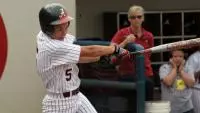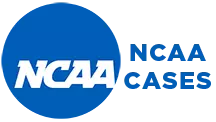
Jessica Smith Travels Long Road to Play First Game
2/20/2007 12:00:00 AM | Softball
TUSCALOOSA, Ala. ?? Jessica Smith was forced to wait a lot longer than any of her teammates to play her first collegiate game as she suffered a season-ending knee injury during the first spring practice of her freshman season in 2006.
Smith, an Alabama product from Pell City, was just like most college athletes, eager to step on to the field for the first time and do whatever they could to help their team win. "Mad Dawg," as she is called by most people close to her, started her career with a bang in the first of two fall tournaments. In her first appearance for the Tide, she faced Wallace-Dothan and went 2-for-3 with a pair of triples, two runs scored and one RBI. Jessica received the nickname when she was little and her friend's father, Donald Davis, called her "Mad Dawg" because she stepped up to bat in a game with paw print stickers on her helmet. The excitement she received from playing in the fall carried over to the spring season but would quickly take a turn for the worse.
On the first day of spring practice she stepped out on to the field and during the first drill of practice she went down with an injury that would keep her out for the entire season.
"It was in the first five minutes," Smith said. "We were working on going back at a 45-degree angle. We would turn our feet back and then run back at a 45-degree angle. Then we would go up like we caught the ball and then plant like we were going to throw back in. When I planted I heard three loud pops and then I just hit the ground. I was laying there and I really didn't know what to do. Everybody was saying don't move. The trainers came over and told me to roll over. They started messing with my knee and everything. I got up and they helped me into the training room."
Jessica's first reaction was that it felt like an injury she had suffered during the summer of her junior year in high school. That year she strained her MCL (medial collateral ligament) in her left knee.
"When I stood up it felt like it came out of place and wasn't really stable," Smith said. "A couple of summers ago I strained my MCL and it kind of felt like that because it would come out of place so I was thinking that I just sprained my MCL again. Molly (Cannell), our trainer at the time, was messing with it and I told her I thought it was my MCL like last time. She didn't really know what it was so she sent me off to the doctor and wrote a note saying it was maybe my MCL.
That afternoon Jessica made the visit to see the doctor. He ran a test on her ACL (anterior cruciate ligament) and found right away that it was torn. He wanted her to get a MRI (magnetic resonance imaging) test done to make sure that she didn't damage anything else in her knee. About a week went by before she had her test and then they found that it was even worse because she had also torn her lateral meniscus in two places as well. She then waited another week before undergoing surgery to repair her knee.
"I really didn't know what to think because I didn't know how bad that was," Jessica said. "It really didn't hit me until the day of surgery that I was going to be out for the season and how much work it was going to be to get back."
"Jessica was absolutely devastated when she hurt her knee," said April Smith, Jessica's mother. "It had been her dream to play for the Tide since she was 13 years old when Coach (Patrick) Murphy first spotted her and started watching her. How bizarre was it that on the first day of practice of her first year, that she has this season-ending injury."
Although Jessica had surgery when she was younger to remove her tonsils, she was really young at the time and didn't remember as much of it, so she was nervous heading into her knee surgery. The surgery ended up going very well, but afterwards Jessica said she didn't feel up to the drive home so she opted to stay overnight and go home the following day. It was that next day when she started on her long road to recovery.
"I had rehab right after surgery and it was hard bending it, so I knew I had long road ahead of me," said Jessica. "I knew I was going to have to work hard and it made me realize how much hard work I was going to have to do to get back. I was determined right then to work hard and get back to playing."
Therapy would be a long and painful process for Jessica. She went through therapy about two or three hours a day.
"Therapy was painful," she said. "They would have to bend it to the point where I couldn't take it anymore. They would have to hold it there and try to stretch everything out again. It was really frustrating because I was really weak and couldn't do things I was used to doing. Sometimes I would get so upset I would start crying. It was really stressful. I was going to make sure that I would come back and play again."
When she would get upset, Jessica called home to talk to her parents, Rick and April. The support she got from her parents helped push her through the hard times and keep a positive attitude towards getting ready to play again.
I called home a lot and my parents told me that I was going to get through it and that it was going to be worth it in the end," said Jessica. "They said things were going to get better and just to try to stick it out."
"I know that she has worked extremely hard on her therapy, so that hopefully she could start this year healed, stronger, and ready to play," said April. "We are proud of her for the hard work and effort."
The therapy was not only painful, but hard and frustrating for Jessica because she would spend every practice in the dugout and go through rehab while her team practiced.
"It was real hard because I wanted to be out there with them," said Jessica.
It would have been real easy for Jessica to sit back and sulk because she was injured for the season, but she chose to make the best out of the circumstances and tried to help her team in any way she could. During games she would pay attention to how her teammates reacted to different situations. She would try to help pick off signals from the opposing team's coach to the pitcher. She would also watch baserunners and try to see if they were stealing or not and let the catcher know.
"Jessica doesn't show her feelings, but I know she was bummed out about not getting to play," said April. "She has never sat out a game in her entire career. It wasn't common practice for her not to be on that field, but I feel like for the most part she held her head and spirit up, and spent the games watching, listening, thinking and cheering on her team. She stood against that rail in the dugout and she watched, she listened and she thought, and did the same at every practice. She has always been very serious about the game, but I am proud of her for being mature and smart enough to make the best out of a bad situation, and use the time off to improve by watching and listening in order to better herself for this year."
Jessica was forced to use crutches a little bit longer because of her torn meniscus. She spent a total of about six weeks on crutches and found during those six weeks that doing everyday things was made a little bit harder and took a little bit longer. However, her teammates helped out as much as they could to try and better the situation for her.
"My teammates would pick me up and drop me off for class so they were a lot of help," said Jessica. "I had to leave earlier and had one class where I had to go up stairs. It took forever and I had to crutch up each one slowly and one at a time. I wasn't able to drive because it was my right leg. I always had to rely on other people to go somewhere. I would always have to move my seat back because my leg had to be straight. Just taking a shower was really hard because I was in the dorm and they had a bathtub shower so I would have to use my crutches to get over the edge of the tub."
After she got off crutches, she had to wear a brace for a couple of months because she couldn't put any pressure on the meniscus or it would mess it up. Over the summer she stayed in Tuscaloosa and worked with the team's strength coach, Michelle (Martin) Diltz.
"I started to run a little bit about three and a half to four months after," Jessica said. "I was real slow and my form was bad. I worked with Michelle all summer and she really helped me a lot. She ended up making me faster and stronger than I was before I tore my ACL. She had me doing things that really worked on my form and getting my knee up and bending it to get more range of motion in it."
She wasn't cleared to play until right before Alabama was scheduled to play its second fall tournament on Oct. 14, 2006. She played and went 1-for-3 with two runs scored and one RBI. However, she didn't finish her therapy and get back to full strength until the end of December, about one year after she heard the three pops on the first drill of spring practice.
Now she is finally back healthy and poised to lead Alabama back to the Women's College World Series. In the Tide's first game of 2007 in San Marcos, Texas, Smith made her collegiate debut as a defensive replacement in left field against Oklahoma State. She appeared in two games in the tournament with her first at bat coming against Texas-San Antonio. This past weekend in the Hampton Inn BAMA BASH! she returned to Alabama and earned her first collegiate start against Toledo on Saturday. She went 2-for-3 with two runs scored and one RBI.
"It was overwhelming," said Jessica. "When I got my first start here at home this past weekend, words can't explain how I felt. I was really nervous at first. I finally got the jitters out and that I actually did good was amazing. I was so excited."
Smith and the Crimson Tide will be back in action this weekend for the Hampton Inn Crimson Classic as they welcome Indiana State, N.C. State, Western Kentucky and Winthrop to Tuscaloosa.




